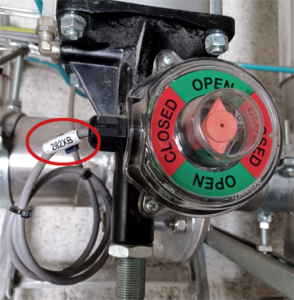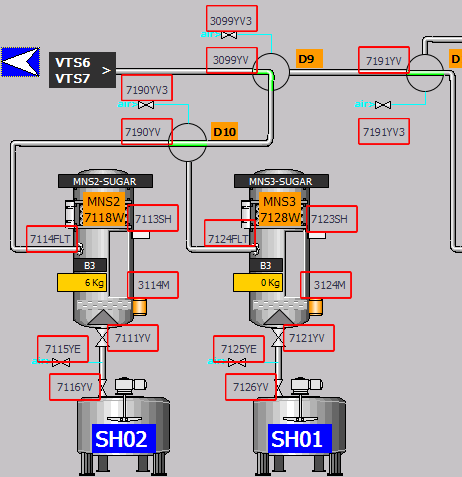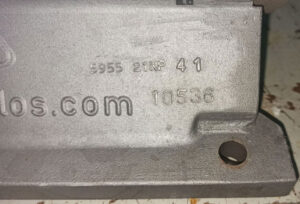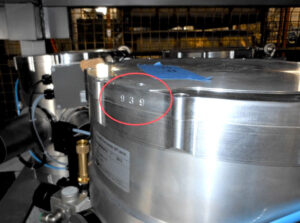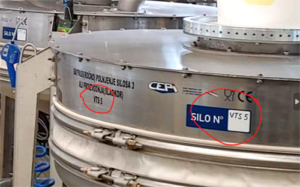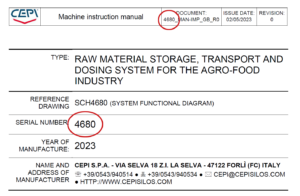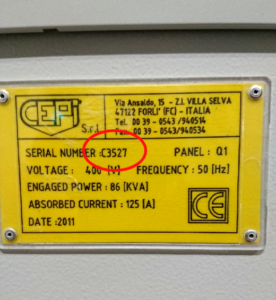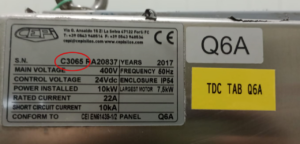Marco Ricci
Production Director
Marco Ricci is Production Director at CEPI. Graduated in Mechanical Engineering, he began his professional experience in other companies, first as Technical Manager and then as Production Manager. In 2007 he joined CEPI as Mechanical Purchasing Manager: being a designer, he certainly doesn’t hold back! In 2009 he obtained his current role as Production Director. Marco, as a good designer, defines himself as a person with a brain always in motion and looking for new inputs. At the basis of his work are people: “My daily life is continuous re-planning, which I do through continuous relationships with my colleagues”.
Marco, as Production Director you supervise the coordination of many resources. What does your job consist of? How do you manage the complexity of the production flow and production calendar, for example?
It’s true, there are many departments next to me and I interact with them daily. They are Manuals, Quality, Purchasing, the Project Engineering, the Technical Office and all the production departments (Workshop, Tailoring, Pre-assembly, Warehouse, Shipping). In parallel, I interface with the Electrical Technical Office and the Sales Office, which is the basis of the entire process.
Once the commercial agreement is closed, the order passes to the office of Project Managers (PM) and Project Engineers (PE). From there, I also come into play, dealing with the management of the future and the management of the ordinary.
Future management consists of planning all production activities of all departments. When we receive an order, the first action I do is to schedule the work of all the departments I deal with, measuring their workload with an internal management system and with a software program.
Ordinary management, on the other hand, consists of a daily check of the workflow and the people involved. My task is to identify problems that may arise from various sources and try to resolve them: from difficulties in supplying material to any complexities in construction, up to emergencies and unexpected events, including staff absences.
My daily life could be defined as a continuous replanning in fitting together every single piece.
I do all this through continuous relationships with my colleagues, from whom I ask for constant feedback.
As Production Manager, I must be there for my colleagues, always. To be able to ask people “How is work going?”, “Are there any problems?”, trying to optimize timing, avoid downtime and give timely and quick responses to unexpected events. People always need to know what to do.

What does “design” mean for CEPI? And for Marco?
Designing means understanding the customer’s needs and solving them. It may sound philosophical, but it’s true. Just as if we were designers, we must find solutions.
Consequently, the designer is someone who never stops. They must always have something new to do and think about, keep their brain moving, receive new inputs and provide solutions.
Design, in CEPI, begins when the customer has the first contact with the company. Our sales team is highly specialized and trained at a technical level and is perfectly capable of carrying out an initial preliminary design of a system. In this first phase, in fact, our salespeople provide real technical advice to the customer, who often has a clear understanding of his needs, but does not know the ways to fill them.
From this preliminary design, we move on to a finishing design: the order passes into the hands of the technicians. Sometimes large changes are made to the preliminary work, other times only minimal aspects or technical details are corrected.
For me, however, planning means challenging myself every day. Design consists of carrying forward a project and building it, day after day, giving shape to my work experience and training.

Can you tell us how a CEPI system is designed?
After the preliminary design by the Sales Office, the order passes into the hands of a pool of people, including R&D. This phase is very important, because it is also thanks to the investment in Research and Development that we are able to offer highly customized systems (we always remember that our goal is to find solutions). Having a very active and proactive R&D department, which interfaces a lot with standard design, is a great added value for CEPI.
The order is then developed by Project Managers and Project Engineers, who interface with me and Eng. Milanesi (Technical Office Manager) for what concerns the standard design and with Eng. Ceccarelli (Research and Development Manager) for what concerns the extraordinary design. At the same time, the Electrical Technical Office led by the Eng. Leonardi also come into play.
How would you define a CEPI plant project? How do the systems differ from each other?
At the basis of every single system there must be the application of the Machinery Directive, ATEX Directive for explosive atmospheres, EN1090, etc.: our machines must be safe, functional, hygienic and have excellent quality. For us designers it is important to find the right solutions to ensure that all these parameters are always respected: in the case of highly cus-tomized systems, it is clearly a challenge, but it is also what is most important to our market.
Another reflection I want to share is that, when you follow a project or new machine, you have to think about how to manage it, how to produce it but also how to assemble it safely.
To better explain what I mean, I’ll tell you an anecdote from my past. I was on holiday in Greece, I was on Delos, a sacred island for the Greeks. In Delos I happened to stop to look at some archaeological finds, which I would de-fine as stones, and my friends made fun of me a bit for this, because I had stopped to look at the stones and was just standing there. In real-ity, I wasn’t looking at the stones, but I was wondering: Whose head thought this up? How did he do it and what was his purpose?
Here, this example is used to understand which philosophy I apply in my daily life, not only at work, but also in everyday life and I also use this approach with people.
Can you be more specific?
People are also the basis of CEPI’s code of eth-ics: “People” is the first of the 5Ps of our code of ethics, because people are the heart of a company, not just the driving force.
When I was offered my responsible role, I chose to apply this principle to all the people under me.
To work well you must value people, respect them as such and make them actively partici-pate and only in this way will you achieve great results.
The same goes for young people too. The beauty of CEPI is precisely this: valuing people and young people and it is only thanks to teamwork with my colleagues that we succeed.

In fact, we can boast of a large roster of under 30s: how do you manage the young people in your team? Do you want to tell us something about your thesis project on steel and circularity?
The young people in CEPI are double the average of Italian companies: this says a lot about our company, which pays so much attention to quality education and training.
I manage young people, but also all my colleagues and colleagues, with a very direct relationship: I like to worry about them and I avoid formalisms. The “you” is a must, even with the last hire, because I want people to feel at ease and, above all, I want them to have respect not so much for the role I have, but for the person I am.
We also chose to entrust the thesis project on the green procurement of steel to a young graduate student to have a positive impact on the circularity of the CEPI plant. It’s a project that has just started, both the engineer and I are following it. Baschetti, my production assistant, and Monia Vittori, Head of Purchase Dept.
Once again, CEPI’s intent is clear: enhancing and investing in collaboration with schools means believing in the future.
One clear thing is that today the kids who leave school don’t have the same dexterity that we once had: this is why we tend to offer them experience in production first (especially during internship periods), to breathe the air of workshop, so that they can better under-stand the difficulties that their colleagues face in their daily lives. This obviously does not preclude their moving to an office, on the contrary, it represents a great plus for them.
Can you tell us about your previous experience? How did you arrive at CEPI?
Can you tell us about your previous experience? How did you arrive at CEPI?
I have a degree in Mechanical Engineering. I carried out a thesis project in the company: it involved a large pneumatic system for the production of biscuits. I took care of both the de-sign of the system, understood as general sizing, and the design of the carpentry parts through also finite element calculation software.
Once I finished my thesis, I worked for a while at the same company as a sales technician, then I changed company. I was Technical Manager for about a year: I followed everything, from design onwards. I started from the preliminary project, up to the construction drawing to send to the workshop. It was a small company, I also took care of purchasing materials; I went directly to the workshop to give directions; I had a continuous discussion with the workshop manager, and finally I also went to the construction site to follow some assembly work.
After that, I returned to the previous company, this time as Production Manager and stayed there for 2 years.
And finally, July 2007 arrives… I landed in CEPI thanks to my friendship with Davide Saputo and entered the Purchasing Office, as Mechanical Purchasing Manager: being a designer, I wanted to get involved and experiment with new things. After a couple of years, I became Production Director. Back then it was a very different reality, there were around 50 of us, today we are 162!
CEPI has just obtained UNI 125. What does it mean for you to be a member of the gender equality committee?
Obtaining UNI 125, the gender equality certification, is a source of pride for me and for this I must say thanks to the committee, in particular to Stefania. It is a project that I fully agree with and I am happy to be part of it. I have to be honest, when I was asked to join the committee for gender equality I didn’t fully realize the type of commitment and I mistakenly believed it to be one more activity to carry out in addition to the many I have to follow.
In fact, it turned out to be a reality I didn’t know about. Day after day I realize that so little is known about gender equality and there is so much ignorance, in the sense that we don’t talk about it enough and consequently we don’t know the topic in its thousand facets. I had confirmation of this when we met the representatives of the Women’s Center of Forlì. When Giulia Civelli, coordinator of the center, and Dr. Succi, psychologist, spoke, I perceived a strange silence inside that room that made me think.
Before joining the committee, as a man, I had never asked myself the problem of gender violence, simply because I don’t even do or think about certain things, and therefore I didn’t feel that they belonged to me. However, the problem certainly exists and must be solved. Thanks to CEPI I understood that there is a real need to talk about it and provide information, because violence is present in our daily lives, even in the smallest moments, in moments of everyday life, in the family, for example.




